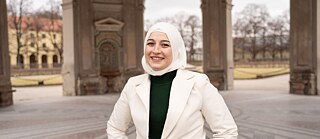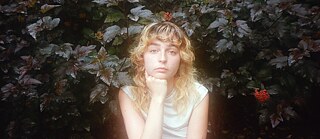Rama Abdulhadi Feels like home to me

Rama Abdulhadi and her family fled war-torn Syria and, after a perilous journey, arrived in Germany in 2015. How has her life unfolded since then? What challenges has she faced? Does she plan to return to Syria? What are her hopes and dreams? This article is based on a discussion that took place during the conference “Flight, Displacement, Immigration: Strategies for Integration?” held on 28 November 2024, in Munich. It includes questions from moderator Verena Hütter and members of the audience. Find out more about Rama’s story.
I’ve been living in Germany since 2015. At the moment, I’m training to become a medical assistant. I’ve been working as a paramedic with the emergency services for over two years. My dream is to study medicine and become a doctor. When I took my Abitur exams, my German wasn’t as strong as it is now and my grades weren’t good enough to study medicine in Munich. But my experience as a paramedic and my training will improve my chances of getting into university. I could have had a place in Rostock, but that’s too far away. Studying in Munich is really important to me, because this is where my family and friends are. Munich feels like home to me. I even get homesick for Munich when I go on holiday.Fleeing from war
We left Syria on 20 August 2015. I remember the day very well. I was 15 at the time. There was a civil war in Syria. We lived in Damascus, in a very dangerous area, and we were under siege. There was no water, electricity or medicine. There were bombings all the time. Once, a rocket landed right next to my brother, Mohamad. Fortunately, he was unharmed. But it was so dangerous that my parents decided we had to leave and look for a new home.My family is made up of my mum and dad, my three siblings and me – I’m the eldest. We left Syria and travelled to Lebanon and then on to Turkey on a large cruise ship. From there, like so many refugees, we continued our journey in a rubber dinghy. In Syria, my parents were quite well-off. My dad owned a furniture business with over 30 employees. He paid a large sum of money so that we could travel to Greece as a family on a yacht – or that’s what we were told. But we were deceived. These people had guns. They told us we could either board the rubber dinghy or not go at all. There were 60 of us crammed into a tiny boat. We weren’t allowed to take anything with us, no bags. We had to hide our most important documents in our clothes. The man at the helm had never steered a boat before. That was a very difficult night. My mum is still afraid of the sea to this day. She’ll never go on a boat again. We heard that a lot of people drowned. I was convinced at the time that I’d drown, too.
But we survived, and we continued our journey on foot to Hungary. There were police at the border and they wouldn’t let us enter the country. They had dogs and used pepper spray. We had to make a detour. My mother injured her ankle and could barely walk. My siblings were still small. My youngest sister Lin was only four years old at the time. We reached a point where we couldn’t go any further, so we handed in our papers. An emergency doctor came to see us and we were given medication. We then took a train from Budapest to Munich. After registering there, we were taken to a refugee home near Munich. It wasn’t a nice place. It was cramped – the walls were really thin, there was no door, no roof. My brother and I went to school, so we had to leave early in the mornings. But it was really noisy, there was always music playing, people arguing. You couldn’t study. Fortunately, after three weeks, we found a small apartment with one living room and a bedroom. We four children slept in the living room, my parents in the bedroom.
My dad worked really hard. I have a lot of respect for my parents. They shaped who I am today. My dad learned German very quickly. After six months, he passed the B1 German exam and started working. He’s a trained upholsterer and today, he works in his original profession and is a department manager at an interior design company in Munich. We applied for a bigger apartment, which we then got. And that’s where we live today.
At school
I was determined to learn German as quickly as possible, too. Initially, I went to a secondary school, and was in a transition class, where different children learn German. We had intensive German lessons. A few months later, I was able to transfer to a high school. I did my Abitur exams there in 2020.It wasn’t easy at all. I had to study a lot. I really worked hard. I slept three hours a day, then spent the rest of the time studying. I told myself: it’s now or never. I’ve always wanted to be a doctor. I didn’t want to look back and regret anything later. That’s why I did my very best. I think it was good the way I did it.
Germans who stare
At first, it was a culture shock. The people here are different, the mentality is different. When you start school in Germany, people don’t speak to you directly. Do you know what they do? They look and stare. They watch you very closely. They don’t make the first move. I didn’t dare make the first move myself. So, we were somehow stuck in this awkward situation. I didn’t understand it at first, because where I come from, it’s different. At our schools, children approach you directly and include you in their group of friends. But after a while, you get used to how things work here.Home
Do we want to go back to Syria? No. The moment we left Syria, we knew we were looking for a new home, a new future where we would be safe, where we could start all over again. Going back was never part of the plan. Of course, we miss our relatives who stayed behind. But we’ve lived through war. We have injuries, we have many traumas. I think the need to be in a safe place with our close family, the people we love so much, to give them a better future, was stronger than the longing for the family we left behind in Syria.Just three kilometres away from our house, a chemical attack took place one night. An incredible number of people lost their lives. These people went to bed and never woke up. After you’ve been through something like that, nothing connects you with your home any more. Staying is no longer an option. All you think about is: “I want to leave”. Safety always comes first.
Do people bother me because I wear a headscarf? Fortunately, Germany values freedom of opinion and freedom of religion. Some people make stupid comments, but usually everyone is respectful, and I’m very grateful for that. I have very few Muslim friends. They’re all either Christians or atheists. My parents are very open-minded. As children, they took us to different places; we visited synagogues and monasteries. My dad wanted us to learn about different religions to make sure we would never struggle to accept others. That had a lasting impact on me. I don’t judge people by their religion. It’s not my place to say: “Hey, you should believe this or you should believe that”. It’s none of my business. I have a clear rule: everyone is equal. What matters is a person’s mind, their thoughts, their outlook on life.
Would my parents mind if I married a German? My mum and dad married for love. And for me there’s no question about it – I want to do the same.
Do I see myself as Syrian or German? I obtained German citizenship in 2020. I was naturalised more quickly because I did so well in the integration process. My parents got citizenship a year later. Today, we’re all Germans; we have German passports. I also identify as German because I’ve picked up a lot of habits here. But I’m also Syrian. I just take the best of both worlds. Whenever someone asks me, I say: I am a German Syrian. Because for me, Germany is home. It’s where I have found security, where my future lies.


